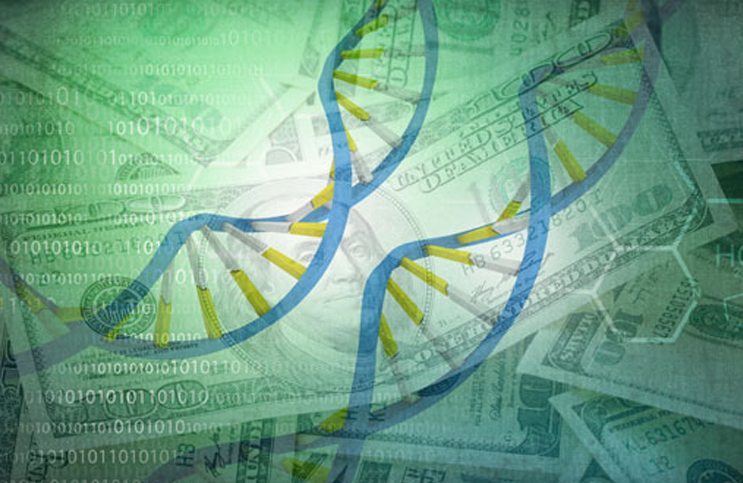
Rarely does the biotech space disappoint from a volatility perspective. Be it up or down, you can bank on some sentiment driven movement at the beginning of every week, and this week is no exception. Here are two of the week’s biggest movers so far – one up, one down – and why action played out as it did.
Click Here For More Market Exclusive Updates & Analysis
Intercept Pharmaceuticals
We’ll start with the upside. Intercept Pharmaceuticals, Inc. (NASDAQ:ICPT) has been gradually declining over the last few months, down from just shy of $175 a share mid-December to $94 at last Thursday’s close – a near 50% drop. On Friday, however, the company gained 27.5% to close out at $120.22.
So why the gain? It comes amid rumors that intercept is shopping around for a potential buyout suitor, and further, that that suitor might be a big pharma behemoth. The frontrunner from the speculative terrace at present is Gilead Sciences Inc. (NASDAQ:GILD). It’s got a pile of cash on its books waiting for allocation, and its product portfolio would benefit from both Intercept’s own portfolio and – perhaps more enticing – the company’s development pipeline.
The FDA has set a PDUFA date for Intercept’s priority review, breakthrough designation lead development candidate, obeticholic acid in a primary biliary cirrhosis indication, of May 29, 2016, and an upcoming advisory panel meeting should offer insight into the likelihood of approval. Both these events could inject further upside into Intercept’s market capitalization, and – in turn – up the potential buyout price big pharma will pay for the just shy of $3 billion (current) biotech.
We’ll set up a focus piece on Intercept over the next few days, and try to put an accurate valuation together to see what the company is worth, but straight off the bat, what is big pharma likely to have to shell out?
Well, it all depends on the upcoming PDUFA. If the drug get’s the green light, we could see an immediate 20-25% upside on the current $3 billion valuation. This would give Intercept an open market valuation of around $3.75 billion. A 30% premium is a very conservative estimate as to what a company like Gilead might pay for a buyout, so we’re probably looking at somewhere just shy of $5 billion at the low end – assuming approval of obeticholic acid in its target indication. If competition for the purchase arises, don’t be surprised if bidding reaches $6.5 billion plus. Definitely one to keep an eye on going forward – expect plenty of volatility ahead of the end of May.
Aegerion Pharmaceuticals
Now then, the downside. Aegerion Pharmaceuticals, Inc. (NASDAQ:AEGR) is a Massachusetts based biotech with a rare disease focus. It’s got a couple of products currently approved in the US – Juxtapid, as an adjunct to low fat diets and Myalept, for leptin deficiency treatment – and a development program that targets what’s called homozygous familial hypercholesterolemia (HoFH), which is the most severe form of familial hypercholesterolemia. It’s also in a bit of a mess. It announced a so called “cost-reduction plan” at the end of last week, that will see a reduction of its circa 300 strong workforce by a minimum of 25%. The severance costs of this element alone are estimated to come in at $1.8 million. It’s got a fairly robust cash position – circa $100 million at the end of September 30, 2015, but it’s losing money quarterly ($9.7 million net for the three months to the September date already mentioned). Further, it expects sales of its lead portfolio product, Juxtapid, to decline, as increased competition hits markets – specifically Amgen Inc.’s (NASDAQ:AMGN) Repatha and Regeneron Pharmaceuticals, Inc.’s (NASDAQ:REGN) Praluent. Both of these drugs are PCSK9 inhibitors, which have proven superiority over Juxtapid in many cases, and not only is the number of patients starting Juxtapid courses declining, but the dropoff rate (comprised of patients switching to PCSK9 inhibition therapies, primarily) is increasing – a cumulative 58% at October 30, 2015, from the drugs approval earlier in the year.
Markets are recognizing the trouble that Aegerion is in, and revaluing the company based on expectations of Juxtapid sales falling off completely, and in turn, the potential combined sales of juts its lead development candidate and its leptin drug Myalept. Myalept sales are reportedly on the up, so this could mitigate some of the Juxtapid selloff, but expect further downside as we head into the middle of this week.





